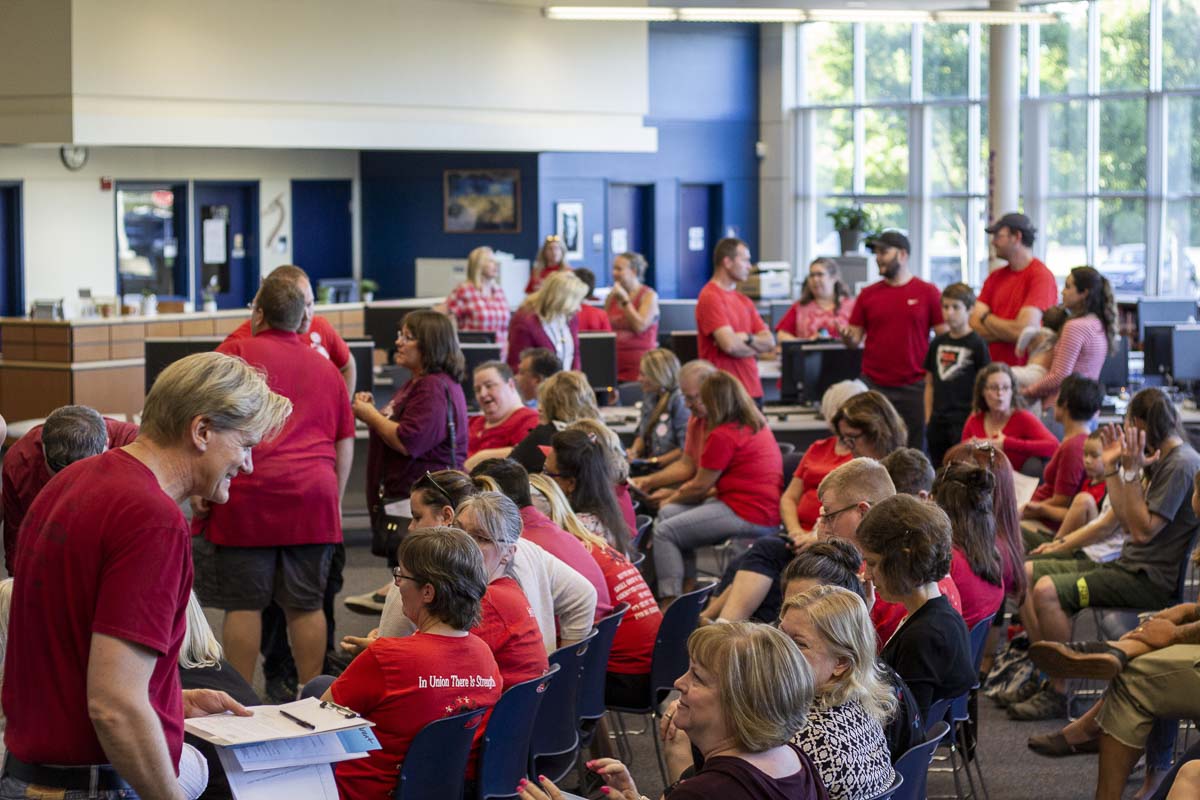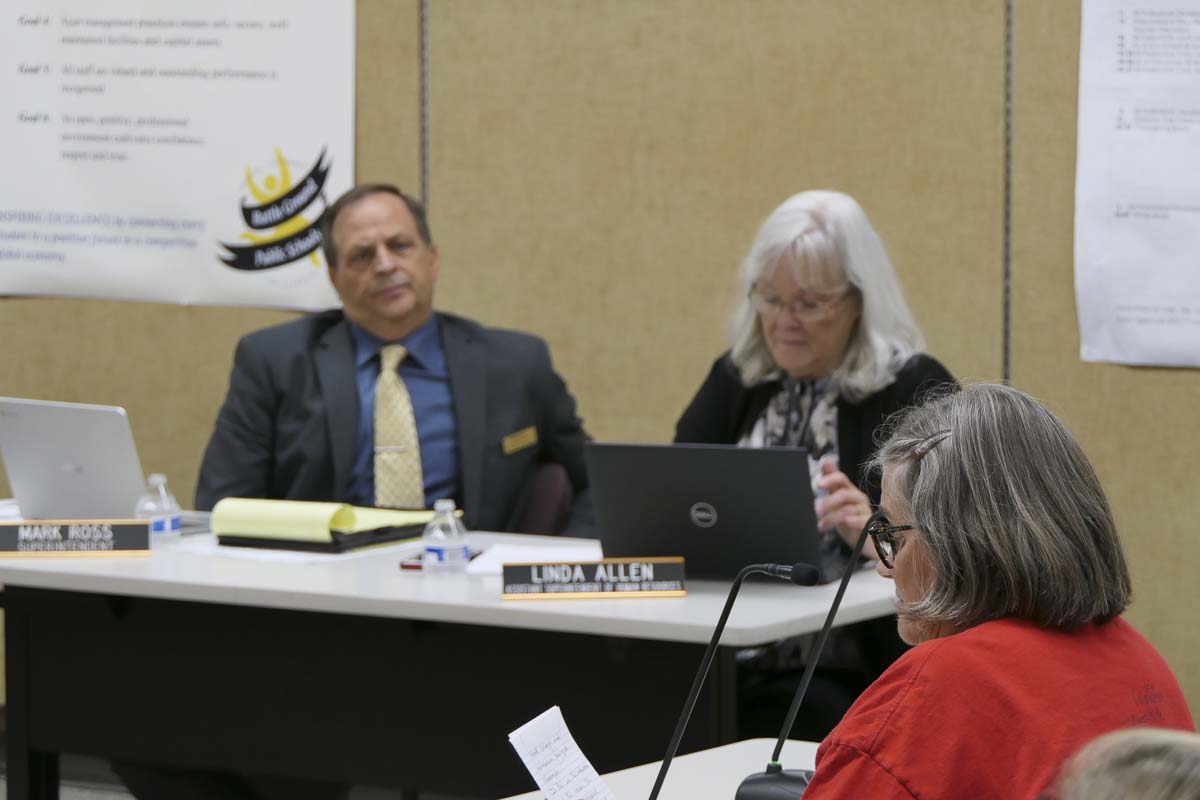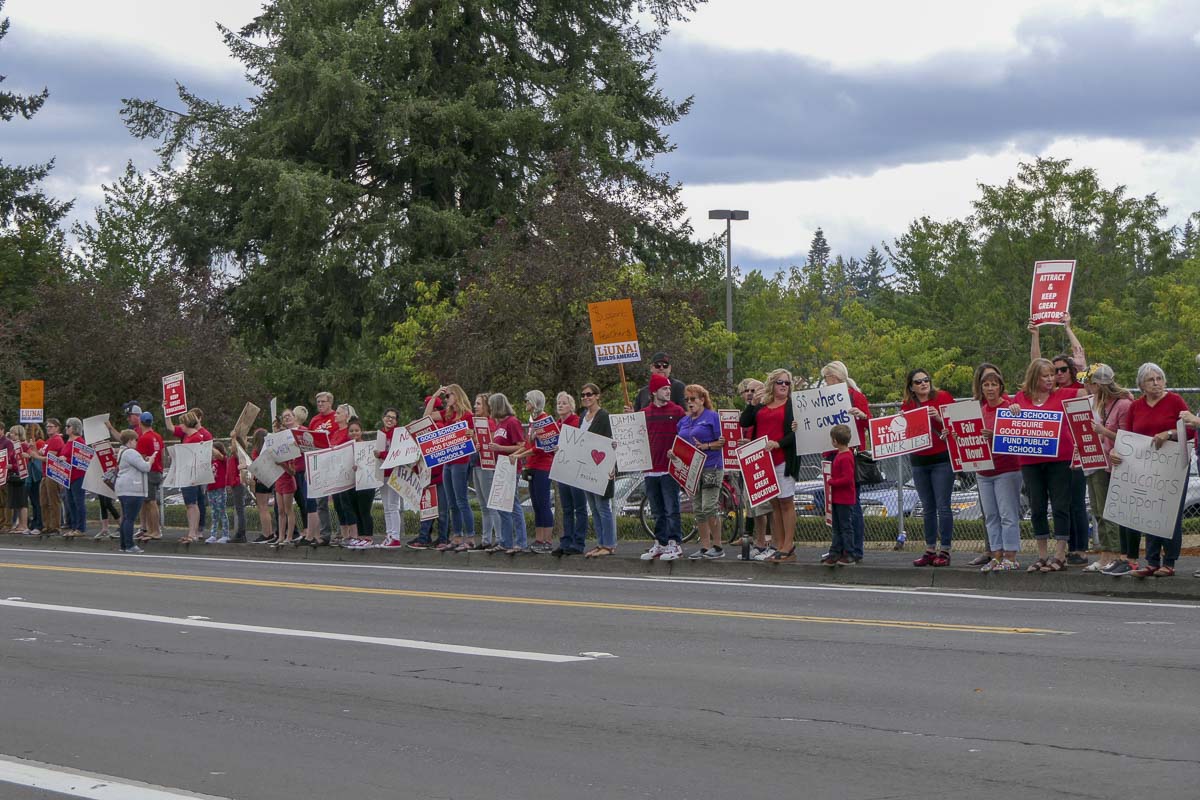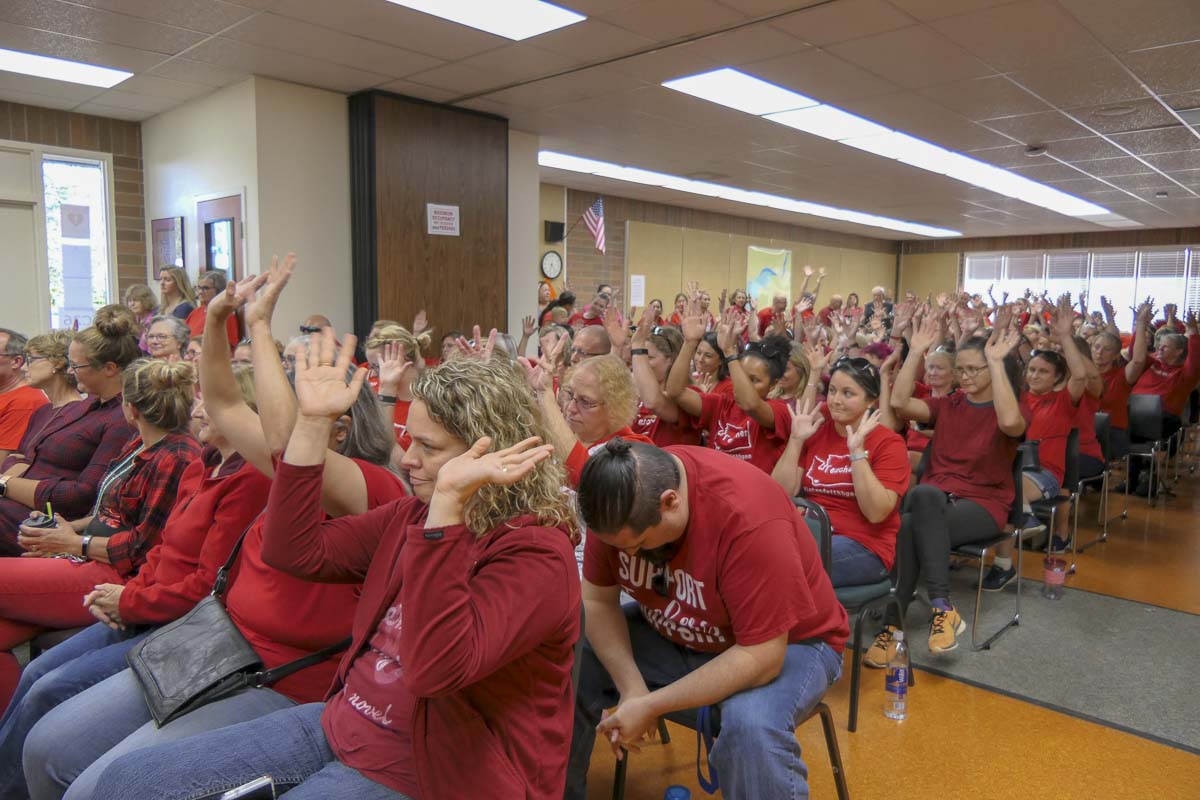The majority of Clark County school kids could see their Summer extended as most school districts face teacher strikes this week
CLARK COUNTY — What started out as a major victory for education in Washington state has turned into a quagmire. According to the Washington Education Association, of the 255 school districts in the state that opened labor negotiations this Summer, 200 have yet to reach a deal.

Starting today, nearly 30,000 Clark County school kids who would normally be back in the classroom will have at least one extra day off. 1,800 educators in the Evergreen School District, and more than 200 Washougal teachers have officially gone on strike as their unions continue to battle with the districts over wage increases.
Of the nine major school districts in Clark County, six have requested mediation from the Public Employee Relations Commission (PERC). If deals aren’t reached today, Vancouver, Battle Ground, Ridgefield and Hockinson would be on strike starting Wednesday. On Monday afternoon Camas teachers voted 95.7 percent in favor of a strike as of September 4 if a deal can’t be reached there.
Evergreen has proposed a raise of 8.3 percent next year, which would put a starting teacher at $50,687, and a top end teacher at just over $96,000. The Evergreen Education Association (EEA) is pushing for three fewer working days, a starting wage of $57,288, and a top end of $97,764.
Teachers have been out in force, waving signs and wearing red, trying to drum up support for their side. Nearly 400 people turned up Monday morning along SR-503 at Main Street to support Battle Ground teachers, and at least a couple hundred Vancouver teachers were urging people to honk in support of their cause along Falk Road south of SR-500 on Monday afternoon.

At the Battle Ground school board meeting Monday evening, hundreds of teachers showed up, waving their hands in solidarity with the half dozen or so people who spoke out in support of them. BGEA president Linda Peterson addressed the board, reminding them that educators and the Washington Education Association were the ones who funded the McCleary lawsuit against the state, and pushed for increased funding from the legislature.
“But at this point we have been told you the board are the decision makers,” she said. “You can decide the money the state intended for educator salaries goes to our Battle Ground educators. We can look at the real numbers in your budget, settle this bargain before tomorrow (Tuesday) evening at 5 PM, or the educators of Battle Ground school district will be on strike. The right decision is yours to make.”
Following those comments by Peterson, the vast majority of the teachers walked out en masse as District 1 Director, and acting board president Monty Anderson tried to address the crowd.
“The Board does care for teachers. We always have,” he said as the crowd continue to file out. “We believe in teachers, but we were also elected by the people, which is the majority, to try to take care of teachers, as well as the fiscal responsibility of the taxpayer.”
Anderson later pointed out that Battle Ground’s offer would make the average salary for their teachers more than $72,000, nearly $3,000 over what the legislature’s funding provided for.
“Anything else, we would have to try to find other areas or some enrichment or other processes to try to achieve a balanced budget,” he added.

Prep sports will go on as scheduled
High school varsity sports are expected to continue throughout the region even if one or more school districts are closed due to teacher strikes.
ClarkCountyToday.com spoke with officials and coaches from several local districts last week and all said they believed the sports schedule will not be affected.
“My last discussion with the district office, is yes, we will play our games. Coaches contracts are separate from teacher contracts,” one official said. “Unless we get other notice from the district office, games go forward.”
That line of thinking was echoed throughout the other districts that could be affected by a strike.
This does not mean coaches can change the practice schedules. Practices at most, or all, districts will not be allowed during what would have been regular school hours. In other words, if practice was previously scheduled for, say, 3 p.m. on a Thursday, that is when practice will start even if there is no school.
The high school sports schedule begins this week. Football in this region begins Friday. Along with football, volleyball, girls soccer, girls swimming, boys and girls cross country, boys golf, boys tennis and slowpitch softball are fall sports sanctioned by the Washington Interscholastic Activities Association.
After the meeting, Battle Ground Superintendent Mark Ross referred to the contract negotiations going on in the wake of the legislature’s McCleary funding like the “wild wild west”. The state did away with teacher salary scales, opting instead for setting a base minimum teacher pay, and letting districts set their own salary scales.
Ross says Time Resource and Incentive (TRI) pay and unfunded staff currently eats up around $16 million of the money they currently receive from local tax levies. After the legislature’s levy cap goes into effect, the district will be getting only $20 million in levy money. That’s why the district is trying to roll what teachers had been getting in TRI pay into their new base salary, then add on the 6.3 percent raise, still well below the 25 percent teachers have been pushing for. The latest offer from the district would phase raises in over three years, amounting to around a 16.4 percent increase at the end of that time.
“We were hopeful that we could come to a mutual understanding about what funds are available to provide teachers with additional compensation,” said Ross. “Unfortunately, BGEA refused to have this discussion with the mediator and the district.”
The Hockinson school board also met to a packed house at the high school library Monday night, hearing from around a dozen people who supported efforts by teachers there to get a raise beyond the 8 percent being offered by the district. That raise would put the average teacher salary in Hockinson around $74,463.
The board met for about 20 minutes behind closed doors, to talk about whether Superintendent Sandra Yager should be given authority to change the school’s calendar if a strike were to drag on. Ultimately they decided to take no action, and that Yager already had that authority.
Who is to blame?
Increasingly, blame for the ongoing teacher wage battles is being laid at the feet of the legislature. In a letter sent to superintendents around the state on August 22, state schools Superintendent Chris Reykdal put it this way.
“As you know, I communicated directly to legislators on July 26 with concerns I have related to the McCleary solution, and specifically E2SSB 6362 (2018),” Reykdal wrote. “My communication focused on two main points: A) Legislative salary language for 2018–19 was not clear; and B) The new funding model creates disparate opportunities for districts to raise compensation in 2018–19 and beyond.”

Reykdal is referring to the formula that lawmakers used to determine how much additional funding districts got, and how much they could receive in local levy funding. Districts like some in King County, where property values are highest, can receive $2,500 per student in local levy funding, while around two-thirds of the state’s districts, including all of Clark County’s districts, are capped at $1,500 per student. Districts also vary widely in how dependent they have been on local dollars.
In a follow-up statement to MyNorthwest.com, Reykdal clarified his statement.
“Some districts got very large regional bumps while we simultaneously are reducing local levies this next school year by statute,” Reykdal said. “And so some districts, that’s kind of neutral to them like they were collecting in the past what they’re allowed to collect now, but for some districts they are losing a significant amount of local money and didn’t get necessarily a lot of new state money, and so those are districts that can keep up in terms of inflation, but there’s simply no way that every district can do double-digit pay increases this next year.”

Clark County Today reached out to the Office of Superintendent of Public Instruction OSPI in June when many of these local teacher wage disputes began to bubble up, and we were told their vague instruction to districts on how to allocate the state’s windfall was intentional.
“How much [the districts] pay teachers is a negotiation between the district and the local bargaining unit (the local union) – OSPI has nothing to do with those negotiations,” wrote OSPI spokesman Nathan Olson in an email. “Again, a certain amount of money is allocated to districts from the state, but as you saw with McCleary, too often the allocated money wasn’t enough to pay what a teacher actually costs. McCleary helped increase the allocation, but it is still up to districts (and of course market value) to determine the exact pay for each teacher.”
But it seems that OSPI, as well as some lawmakers, have increasingly become agitated at the formula used in Olympia for the McCleary funding as labor disputes drag on into the school year. Many say it leaves far too much ambiguity about how districts should cope with the loss of local funding sources. The Washington Education Association has argued that lawmakers were clear in their intention that one-time revenue from the McCleary decision go to fund raises for teachers, but district leaders argue that doing so in the face of local funding shortfalls would mean making cuts elsewhere.
“I couldn’t agree with the district more that we got screwed by this stupid levy thing that they did,” says BGEA President Linda Peterson. “I really, truly believe that in year 2019-2020 and 2020-2021, they’re going to change that again, because they realize that they didn’t do it correctly. They screwed up.”
ClarkCountyToday.com Reporter Jacob Granneman contributed to this report.




